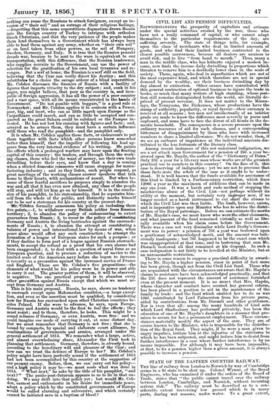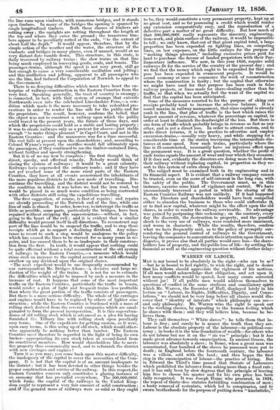STATE OF THE EASTERN COUNTIES RAILWAY.
Ma line of railway from London to Norwich by way of Cambridge seems in a fit state to be shut up. Colonel Wynne, of the Royal Engineers, -who has examined it under the orders of the Board of Trade, states that. "the public cannot travel over the railway between London, Cambridge, and Norwich, without incurring serious risk." The railway must be described as to a con- siderable extent traversing low ground which is in many parts, during wet seasons, tinder water. To a great extent,
the line runs upon viaducts, with numerous bridges, and it stands upon timbers. In many of the bridges the opening is spanned by single longitudinal timbers. Both these claims of timbers are rotting away ; the uprights are rotting throughout the length at the top and where they enter the ground ; the transverse tim- bers appear to be peculiarly rotted at the ends, "to the extent of about half the depth." It would appear, therefore that by the simple action of the weather and the water, the structure of the viaduots and bridges in many places, even if unused, would at no very distant date tumble down. This structure, in this state, is daily traversed by railway trains ; the slow trains on that line being muoh employed in conveying goods, coals, and beasts. The passenger-trains, although the speed is not very great, still go fast enough to cause a very considerable oscillation and jolting ; and this oftillation and jolting, apparent to all passengers who use the line, had induced the Corporation of Norwich to appeal to the Government.
There is no denying difficulties which must have beset the en- terprise of railway-construction in the Eastern Counties from the very first. Speaking generally, the tract of country is swampy ; is connected, in fact, with that system of swamps that extends Northwards even into the celebrated Lincolnshire Fens —a con- dition which made it the more necessary to take redoubled pre- cautions in order to render the line safe for the public and for the proprietors. The result, however, confirms the belief, that the object was not to construct a railway upon which the public could travel in the present years, the future of those days, and which the proprietors could hold as a stable and lasting property ; it was to create railways only as a pretext for shares—just stable
• enough "to make things pleasant "in Capel Court, and not in the Eastern Counties : and the manceuvre was for a time successful. The cost fulls at present upon the shareholders; and, according to Colonel Wynne's report, the sacrifice would fall ultimately upon the passengers, if they continued to use the timber-sustained lines, without further and speedy strengthening.
But it is of no use now to complain ; the first thought is, the direct, speedy, and effectual remedy. Nobody would think of closing the system of railways ; it would be a great calamity. Railways have superseded the ordinary roads ; and if they have not yet reached some of the more rural parts of the Eastern Counties, they have at all events accustomed the inhabitants of the more populous districts to the new mode of travelling. Dis- oontinne the travelling, and the district would not be restored to the condition in which it was before we had the iron road, but would be placed in so much worse condition as being contrasted with other districts still using the expeditious travelling.
The first suggestion, of course, is that of repairs ; and repairs are already proceeding at the Norwich end of the line, while one line of 11.i.6 is dosed. In order, however, to interrupt the traffic as little as possible, some parts, particularly the bridges, have been repaired without stripping the superstructure—without, in Met, going to the 'heart of the evil ; and it is evident that a similar &Acuity would present itself in all directions. TO reconstruct any part of the line would be to -suspend the traffic, and to stop those receipts which go to support a declining dividend. Any reluc- tance to resort to such a step would be analogous to the policy which has caused the lines to be starved for so many years in re- pairs and has caused them to be so inadequate in then construc- tion from the first. In truth, it would appear that nothing could be quite effectual without a total reconstruction of the old system of railways in the Eastern Counties,—a measure which would ciuse such an increase to the capital account as would effectually tiviallow up any dividend upon the original shares. *The next expedient would be one frequently recommended by . our correspondent Mr. Bridges Adams—a decisive and large re- duction of the weight of the trains. It is not for us to estimate the difficulties winch might be imposed by such a measure in the increase of cost. It happens that some of the most important traffic on the Eastern Counties, particularly the traffic in beasts, would render a plan of light and frequent trains less profitable than where the great portion of the traffic consists of passengers. But there is a more serious difficulty. The whole of the carriages . and engines would have to be replaced by others of lighter con- struction; while the Eastern Counties is burdened with a mass of rolling stook derived from the several companies which are amal- gamated to form the present incorporation. It is this superabun- dance of old rolling stock which is advanced as a plea for having furnished the Tilbury line with rolling stock upon peculiarly easy terms. One of the expedients for getting custom, as it were, upon easy terms, is this using up of old stock, which would other- wise apparently be nothing better than lumber. The Eastern Counties must therefore be regarded in the light of being its own broker—appropriating its own stock taken at second-hand from its constituent members. How would shareholders like to sacri- fice property thus economically used, and to refurnish the district
with new carriages and engines ? •
Turn it as you may, you come back upon this master difficulty, the inadequacy of the capital to cover the necessities of the Com- pany. It is not that the capital is of an amount inadequate to the district ; but it has been devoted to other things besides the proper construction and service of the railway. In this respect,the Eastern Counties concern only constitutes a glaring instance of an economy that has prevailed everywhere. The 300,000,000/. which forms the capital of the railways in the United King- dom ought to represent a very fair amount of solid construction; and if the general mass of railways were as solid as they ought
to be, they would constitute a very permanent property, kept up at no great cost, and so far possessing a credit which would render any extension comparatively easy, and the reproduction of a defective part a matter of no great difficulty. But how much of that 300,000,0001. really represents the masonry, engineering, iron-work, and plain surface of the railway, it would be impossible to tell ; we only know, that out of that great capital total, a large proportion has been expended on fighting lines, on competing lines, on law expenses, on the little outlays for the purpose of "making things pleasant," including excessive prices paid for land to purchase the favour of landed proprietors with their Par- liamentary influence. We now, in this year 1856, require solid railways fit for the service of the county at the present day ; and we find that the money which ought to be expended for that pur- pose has been expended in evanescent projects. It would be sound economy at once to commence the work of reconstruction where the construction is faulty ; but the capital that otherwise we might have used for that purpose has been sunk in false railway projects, or lines made for share-dealing rather than for traffic, so that when we actually feel the want of the capital we find that the capital has been anticipated. Some of the measures resorted to for the purpose of eking out receipts probably tend to increase the adverse balance. It is a sound maxim in railway management, that since capital is already sunk in the line that gm of traffic is the best which raises the largest amount of revenue, whatever the percentage on capital, in order at least to diminish the deadweight of the loss. But there is one form of traffic which probably brings in revenue as fast as any other, and is yet a direcfloss. In order to attract custom, and to make direct returns, it is the practice to advertise and employ excursion-trains,—usually very heavy, and while stopping for a considerable time at the station traversing the intermediate dis- tances at some speed. Now such trains, particularly where the line is ill-constructed, necessarily have an injurious effect upon the permanent way. It is a great question whether the profit of such trains equals the amount of wear and tear which they occasion. If it does not, evidently the directors are doing more to beat down their railway without replacing capital, in proportion as they re- sort to this system of extra cheap trains.
The subject must be examined both in its engineering and in its financial aspect. It is evident that a railway company cannot be trusted, even on the score of self-interest in the long run, with the safety of the public. The Government must, as in this instance, exercise some kind of vigilance and control. We have unconsciously traversed a period in which the closing of the Eastern Counties Railway was not unlikely. If it had happened , so, the Directors and shareholders would have been compelled either to abandon the business to those who could undertake it, or to find new capital, whatever might be the effect upon the old shares, in order to render the railway serviceable. No advantage was gained by postponing this reckoning ; on the contrary, every day the discredit, the destruction to property-, and the possible shock to the very use of railways, were rendered more imminent, and worse in character. While the results, therefore, confirm what we have frequently said, as to the policy of promptly sur- rendering the general control of railways to the Government, leaving the companies to concentrate their attention upon their own disputes, it proves also that all parties would save loss—the share- holders loss of property, and the public loss of life—by settling the financial as well as the engineering question without further delay:



























 Previous page
Previous page